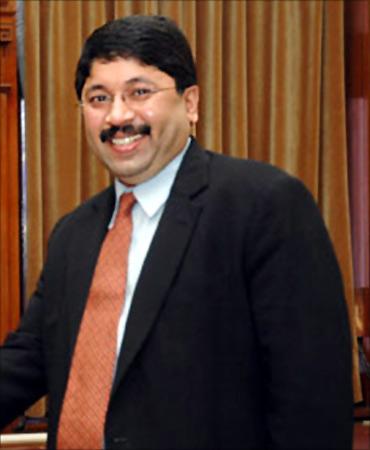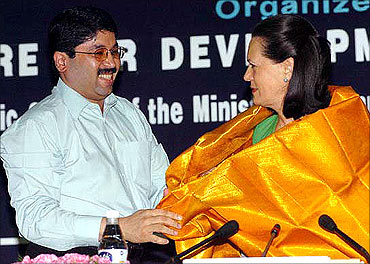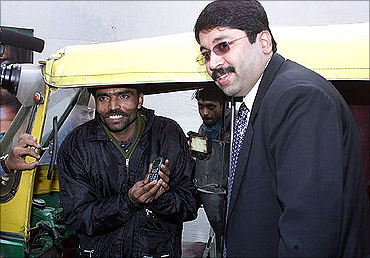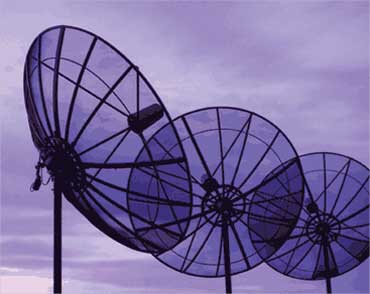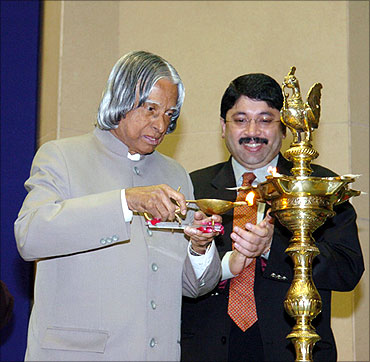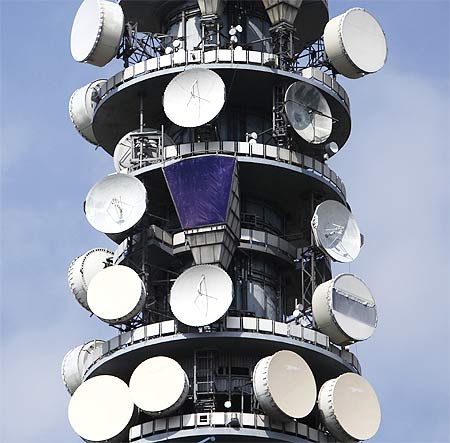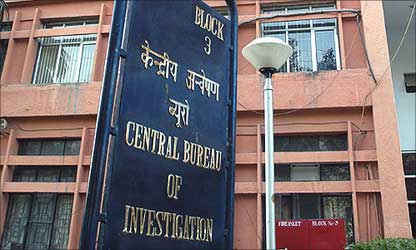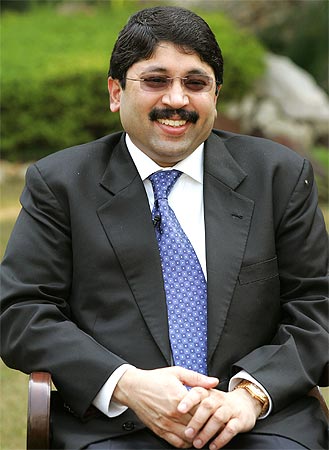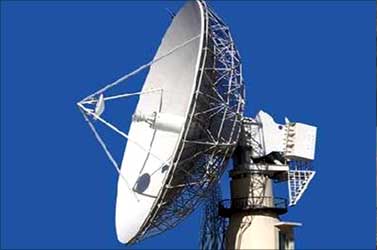 | « Back to article | Print this article |
2G scam: All about Dayanidhi Maran's alleged 'role'
According to Joshi, Maran was instrumental in changing the spectrum pricing while he was the telecom minister.
All the powers vested with the group of ministers on spectrum pricing were transferred to the telecom department.
This is how India's biggest scam was born.The allegation against Maran is that he favoured a Malaysian company Maxis while granting telecom licences, which later invested Rs 600 crore (Rs 6 billion) for a 20 per cent stake in Sun Direct, owned by his brother Kalanidhi Maran.
Former BJP general secretary K N Govindacharya said Prime Minister Manmohan Singh must quit for keeping quiet about these allegations. The Bharatiya Janata Party has also demanded Maran's resignation.
Amid the charges and counter-charges, we look at why Dayanidhi Maran is now at the centre of the 2G controversy, which cost the exchequer billions of dollars.
Click NEXT to read on . . .
2G scam: All about Dayanidhi Maran's alleged 'role'
The 2G scam cost the nation Rs 176,379 crore (Rs 1.76 trillion) as licences were issued to private telecom players at throwaway prices in 2008. According to the Comptroller and Auditor General (CAG), rules were flouted while issuing licenses to telecom companies.
The allocation did not consider the correct value of the scarce spectrum and the entire process was manipulated to benefit some companies.
The CAG said 85 out of the 122 licences were issued to ineligible applicants.
Maran indirectly received benefits to the tune of Rs 700 crore (Rs 7 billion) after granting licence to Maxis, according to a report in Tehelka magazine.
After Maxis bagged the new telecom licences, the company's subsidiary invested in the companies owned by Kalanidhi Maran.Click NEXT to read on . . .
2G scam: All about Dayanidhi Maran's alleged 'role'
According to a Tehelka report, Dayanidhi Maran denied new licences to Aircel. C Sivasankaran-owned Aircel failed despite making several attempts from 2004-06 for new licenses.
Sivasankaran alleged his applications were rejected arbitrarily when Maran was the telecom minister in 2006, forcing him to sell his company's stake to Maxis. Sivasankaran sold 74 per cent of his stake in Aircel to Maxis group in May 2006. It was only after Malaysia-based Maxis, a company Maran's friend owns, bought stake in Aircel, that the decks were cleared for issuing new licenses.Besides investing in Sun Direct, the Maxis Group invested Rs 100 crore (Rs 1 billion) more in another Maran family-owned company named South Asia FM Ltd which owns Sun FM radio network, reports Tehelka.
Maran, meanwhile, has filed a suit against Tehelka.
Click NEXT to read on . . .
2G scam: All about Dayanidhi Maran's alleged 'role'
The Justice Shivaraj V Patil Committee report tabled in February this year stated that Maran had deviated from normal procedures in allocating telecom licences.
The Committee, which examined the telecom policies and allocation of spectrum from 2001 to 2009 said, Maran went against the rulebook and did not take the approval of the Finance Ministry in the telecom license deals.
Earlier in February, Arun Shourie, former Telecom Minister in the National Democratic Alliance (NDA) government, told the Central Bureau of Investigation (CBI) that 2G spectrum allocation scam started when Dayanidhi Maran was the Telecom Minister.
"It was in Mr Maran's time that one sentence was put into the guidelines that there shall be no cap on the number of operators in a circle. Such a change could only come in the form of a Telecom Regulatory Authority of India (TRAI) recommendation," Shourie had said.
The Tehelka report, which has created a storm raises questions on why Maran stalled Aircel's efforts to get telecom licences for about two years and how this changed after Maxis bought stake in Aircel.
According to Tehelka, in March 2007, three months after the Malaysian compnay bagged the telecom licences, a Maxis Group company, Astro All Asia Networks through its subsidiary South Asia Entertainment Holdings Ltd set up joint venture with Sun Direct TV to provide DTH services in India.
Maran's family owned company, Sun Direct received substantial investment from Maxis group which bought 20 per cent equity in Sun Direct. Maxis group invested a total of Rs 599.01 crore (Rs 5.99 billion) in Sun Direct between December 2007 and December 2009," a PIL filed by the Centre for Public Interest Litigation alleged.
The transactions show a clear case of quid pro quo for getting Universal Access Services Licences (UASL) by Maxis group, the PIL pointed out.
Click NEXT to read on . . .
2G scam: All about Dayanidhi Maran's alleged 'role'
Maran said, the reports published in the magazine are totally false, defamatory, derogatory and has been published with a malafide intention and ulterior motive.
He said he has no shareholding or interest in any form in Sun-Direct TV and it is a separate legal entity and it is in no way connected with its business transactions.Click NEXT to read on . . .
2G scam: All about Dayanidhi Maran's alleged 'role'
The grand nephew of Dravida Munnettra Kazhagam (DMK) chief M Karunanidhi, Maran was earlier forced to quit as telecom minister in 2007 after the result of a rivalry between him and Karunanidhi's sons.
"If my exit from the party and the Cabinet would please my party leader and his family, I am only too happy to do so," Maran had said in his resignation statement. Maran later apologised and got back into his grand uncle's good books, paving the way for a second innings as a Cabinet minister. Tamil Nadu Chief Minister J Jayalalithaa has demanded the resignation of Dayanidhi Maran. She said Maran should quit and face legal proceedings.As allegations crop up before another Cabinet reshuffle, Maran has an uphill task to prove himself innocent and stay in power.
Click NEXT to read on . . .
2G scam: All about Dayanidhi Maran's alleged 'role'
Tehelka says Maran's legal notice is just intimidating without addressing the core issues raised in the story.
Maran said he was "not even" a minister when Maxis's unit invested in Sun Direct in December 2007, as he had resigned as a minister on 13 May 2007.
In its reply Tehelka said, "While it is true that Maran then resigned on May 13 2007, it is clear the apparent quid pro quo had already been set in motion while he was in office."
Click NEXT to read on . . .
2G scam: All about Dayanidhi Maran's alleged 'role'
The telecom transactions reveal that the big ticket deals were sealed at throwaway prices.
Aircel paid only Rs 1,399.47 crore (Rs 13.99 billion) for these licences when its actual value was Rs 22,000 crore (Rs 220 billion).
What are the views of Aircel founder?
In a statement to the Central Bureau of Investigation (CBI), Aircel founder C Sivasankaran alleged that he was forced to sell his stake in Aircel to Maxis Communications of Malaysia, after his applications were rejected several times to favour another businessman.
Sivasankaran, who went on his own to meet CBI officals, said Maxis was offered licences for seven more circles after it took over Aircel.Click NEXT to read on . . .
2G scam: All about Dayanidhi Maran's alleged 'role'
The Centre for Public Interest Litigation has moved the Supreme Court demanding a CBI investigation into allegations on Dayanidhi Maran's alleged deal with Aircel.
The CBI is looking into financial transactions of Sun TV and Maxis. It is also checking various aspects of Maxis group's deal with Aircel.
Click NEXT to read on . . .
2G scam: All about Dayanidhi Maran's alleged 'role'
With a new controversy springing up each day, opposition parties are up in arms against the government.
The Bharatiya Janata Party (BJP) said it is a case of "bribery and quid pro quo" as he gave licenses and allotted spectrum to Aircel at throwaway prices. The BJP wants Maran to resign for his role in the 2G scam.
The All India Anna Dravida Munnetra Kazhagam, Communist Party of India (Marxist) and the BJP have called for a detailed investigation into allegations that Maran's family benefited from decisions and policy changes he made as Telecom Minister between 2004 and 2007.